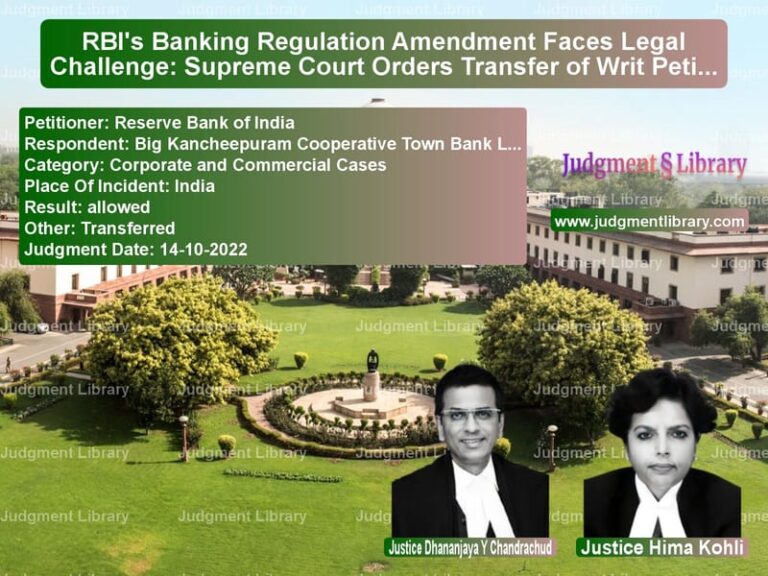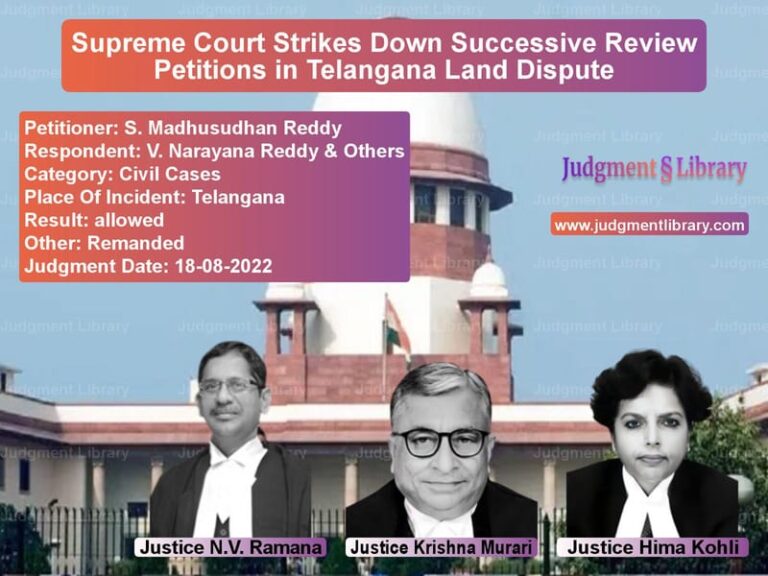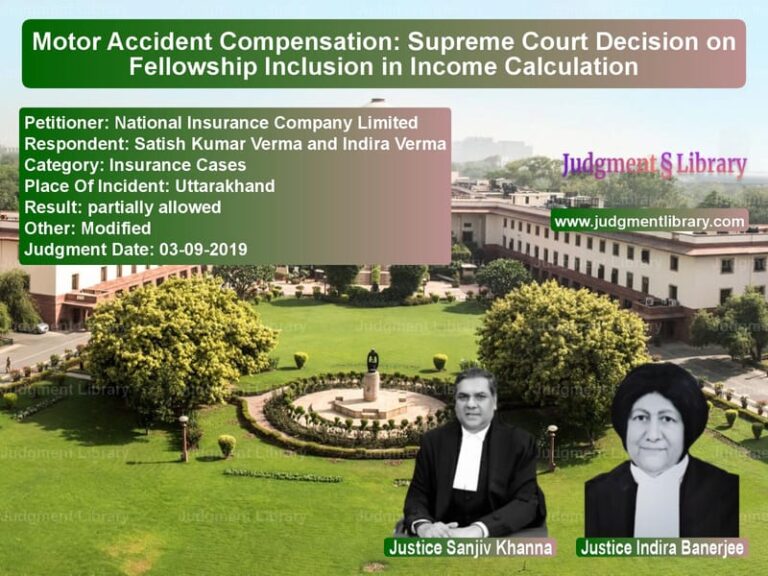Supreme Court Acquits Appellant in NDPS Case: Emphasizes Importance of Producing Contraband in Court
The Supreme Court of India, in the case of Krishan Kumar v. The State of Rajasthan & Anr., acquitted the appellant of charges under the Narcotic Drugs and Psychotropic Substances Act (NDPS Act), emphasizing the importance of producing contraband before the court during the trial. The judgment, delivered on August 14, 2018, by a bench comprising Justice Ranjan Gogoi, Justice Banumathi, and Justice Navin Sinha, highlights key issues related to evidence handling, judicial integrity, and procedural fairness in narcotics-related cases.
Background of the Case
The appellant, Krishan Kumar, was arrested and charged under Section 18 of the NDPS Act for possession of a large quantity of opium. According to the prosecution, on April 30, 1998, the appellant was intercepted while riding a scooter, and upon searching his bag, a total of 7 kilograms of opium was discovered. Two samples weighing 20 grams each were taken, sealed, and later sent to a forensic laboratory where the substance was confirmed to be opium. However, the trial court acquitted the appellant, citing issues with the chain of custody and non-compliance with Section 50 of the NDPS Act. The State of Rajasthan appealed the acquittal to the High Court, which reversed the decision and convicted the appellant, sentencing him to ten years in prison. The appellant then filed an appeal before the Supreme Court.
Petitioner’s (Appellant’s) Arguments
The appellant’s legal counsel presented the following arguments:
- The trial court had acquitted the appellant due to non-compliance with procedural safeguards, including the failure to produce the contraband before the Magistrate and the absence of the requisite Magistrate’s order to validate the seizure.
- The prosecution failed to prove the connection between the samples sent to the forensic lab and the substance allegedly seized from the appellant.
- Reliance on oral testimony regarding the handling of the contraband was insufficient, and no documentary evidence corroborated the seizure process.
- The conviction was based on inadequate evidence and procedural errors, thus violating the appellant’s right to a fair trial.
Respondent’s (State of Rajasthan’s) Arguments
The respondent, representing the State, argued:
- The High Court correctly found that the contraband was duly seized and handed over to the authorities, supported by the testimonies of police officials.
- The sample seals had been properly recorded, and the forensic report confirmed the presence of opium in the samples.
- The failure to produce the contraband before the Magistrate was a minor procedural lapse that did not affect the core evidence of possession.
- The conviction was based on sufficient and credible evidence, and the acquittal by the trial court was a result of an erroneous assessment of the facts.
Supreme Court’s Observations
The Supreme Court considered the following key points:
- The Court reiterated the importance of the chain of custody in NDPS cases. If the contraband is not produced in court and there is no explanation for its non-production, the prosecution’s case collapses.
- The Court found that the appellant’s acquittal was justified due to the failure to produce the contraband before the Magistrate, as required by the law. This failure to comply with the procedure made it impossible to link the seized substance to the samples tested in the forensic lab.
- The Court referred to previous judgments, including Vijay Jain v. State of Madhya Pradesh (2013), where it was emphasized that mere oral evidence was insufficient to prove the seizure of contraband unless it was corroborated by documentary evidence.
- The absence of the Magistrate’s order or other official records to confirm the seizure and production of the contraband was a critical flaw in the prosecution’s case.
- The Court emphasized that in appeals against acquittal, the appellate court must find substantial grounds before overturning the trial court’s decision, especially when the acquittal is based on procedural errors that do not affect the substance of the case.
Final Judgment
The Supreme Court issued the following directives:
- The appellant’s conviction under Section 18 of the NDPS Act was set aside.
- The acquittal by the trial court was upheld, and the appellant was acquitted of the charges.
- The judgment highlighted the importance of adhering to procedural safeguards, particularly in cases involving the seizure and handling of contraband.
Impact of the Judgment
This ruling had significant implications for criminal trials, particularly those involving narcotic substances:
- Procedural Fairness in NDPS Cases: The judgment reinforced the need for strict adherence to legal procedures in narcotics-related offenses, including the proper handling and documentation of contraband evidence.
- Strengthening Evidence Requirements: The Court emphasized that oral testimony alone is insufficient in NDPS cases and that documentary evidence linking the seized substances to the forensic report is essential for conviction.
- Upholding the Right to Fair Trial: By acquitting the appellant, the Court protected the fundamental right to a fair trial, ensuring that procedural errors do not lead to unjust convictions.
Conclusion
The Supreme Court’s decision in Krishan Kumar v. The State of Rajasthan & Anr. serves as a significant reminder of the importance of following due process in criminal cases, particularly those involving narcotics. The ruling upholds the principle that a conviction cannot be sustained unless the prosecution meets its burden of proof, especially when key procedural requirements are not met. This case stands as a precedent for ensuring that fairness is maintained in all criminal trials.
Petitioner Name: Krishan Kumar.Respondent Name: The State of Rajasthan & Anr..Judgment By: Justice Ranjan Gogoi, Justice Banumathi, Justice Navin Sinha.Place Of Incident: Rajasthan.Judgment Date: 14-08-2018.
Don’t miss out on the full details! Download the complete judgment in PDF format below and gain valuable insights instantly!
Download Judgment: Krishan Kumar vs The State of Rajasth Supreme Court of India Judgment Dated 14-08-2018.pdf
Direct Downlaod Judgment: Direct downlaod this Judgment
See all petitions in Fraud and Forgery
See all petitions in Theft and Robbery Cases
See all petitions in Custodial Deaths and Police Misconduct
See all petitions in Judgment by Ranjan Gogoi
See all petitions in Judgment by R. Banumathi
See all petitions in Judgment by Navin Sinha
See all petitions in allowed
See all petitions in Quashed
See all petitions in supreme court of India judgments August 2018
See all petitions in 2018 judgments
See all posts in Criminal Cases Category
See all allowed petitions in Criminal Cases Category
See all Dismissed petitions in Criminal Cases Category
See all partially allowed petitions in Criminal Cases Category







